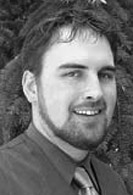Concerns rise over Ombuds duel position on campus
Ian Darling, the current Ombudsperson at Fanshawe College has been serving as a part-time teacher in the Business Division of the college since last semester, when he taught a Leadership in Organizations course. Darling is also teaching the Business course Understanding Work Place Behaviour for the current semester at Fanshawe.
 The fact that Darling is holding both positions at the College has raised concerns by the FSU over a potential conflict of interest that could be present regarding Darling's duel roles.
The fact that Darling is holding both positions at the College has raised concerns by the FSU over a potential conflict of interest that could be present regarding Darling's duel roles.
The Ombuds Office, where Darling has been employed since May of 2000, is an independent office jointly funded by the College and the FSU. It receives complaints from students and employees about the operation of the College and FSU.
Darling said in his role as the Ombudsperson he can informally make recommendations to help point individuals in the right direction to solve their conflict, or he can conduct an investigation and create formal recommendations for how he thinks a problem can be resolved.
Christine Thomson, president of the FSU, said the Ombudsperson is supposed to be a neutral third party in regards to the students and the teachers of the school.
“The Ombuds position is someone the students can go to who is impartial, and who is a bit removed from the college,” Thomson said. “Now, not only with students but also these teachers are now colleagues, therefore if there is a situation, it just opens up doors that we hope really should not be opened. The Student Union just feels that there is a potential for a conflict of interest.”
“Because the Ombudsperson is an employee at the college, there are a whole bunch of things that I do that have levels of conflict of interest,” Darling said.
Darling provided examples of himself sitting on committees that handled the creation of different policies at the College, and the fact that down the road he would end up dealing with complaints, in his Ombuds person position, regarding the same policy he helped create.
“In terms of conflict of interest, there are two elements to it. One is an actual conflict of interest and the other is a perceived conflict of interest,” Darling said. “The key to handling these levels of conflict of interest is managing them and reducing the impact of them. On a regular basis I have to balance the challenges of working in the institution, and working with the people working in the institution, and at the same time hearing complaints about these people.”
In hopes of managing the potential conflict of interest in this situation, Darling said he has made an arrangement with Adrienne Clarke, the University of Western Ontario's Ombudsperson, to handle any complaints that students in Darling's classes may have with him.
The FSU met with the Ombuds Advisory Committee, the committee that oversees the Ombuds office, and Darling in December and were presented with a drafted agreement on the matter. Upon review of the agreement the FSU still felt uncomfortable with Darling holding both positions.
“At this time, the FSU still does not feel that they wish to support the Ombuds teaching position. After we reviewed the drafted agreement, our biggest concern is signing something that declares a “potential conflict of interest.” We do not feel that this is in the best interest of the students, or ourselves to sign something that says this,” Thomson said in a letter addressed to the Ombuds Advisory Committee dated December 10, 2006.
Darling said he originally contacted the FSU in November, yet did not receive a response from the FSU until a month later expressing their concerns.
Manager of the Marketing and Communications department Emily Marcoccia said that the President of Fanshawe College, Howard Rundle, thought that the matter had been taken care of in December.
“According to President Rundle, he thought the matter was resolved,” Marcoccia said. “Another Ombudsperson is in place for Ian if a situation arose. The college has not had an opportunity to deal with the situation having thought it was resolved in December.”
Not receiving any payment for his teaching position, Darling said he took the opportunity as a chance to improve his skills as the Ombudsperson.
“I'm not getting paid to do this teaching, so there is no monetary benefit for me. I've made the commitment that my priority is the job as Ombudsperson,” Darling said. “If I were being paid, I think the potential conflict of interest may be greater because there would be my personal interest in it. Essentially the benefits in terms of improving my practice are more then the potential risks for conflict of interest with the provisions that I've put in place.”
Marcoccia, Darling, and Thomson all said that the issue would have to be dealt with more thoroughly during the summer months.













